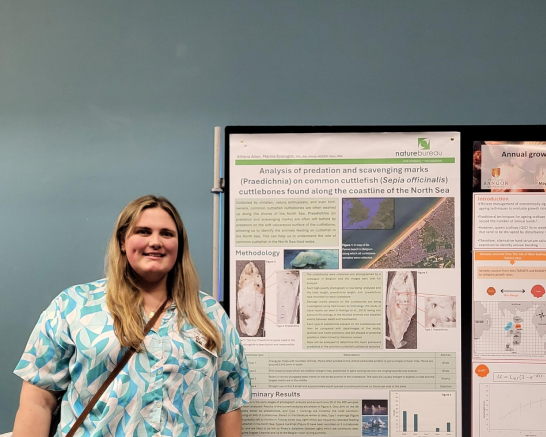An exciting year ahead for our ecology team!
-min.jpg)
By Paul Goriup, Head of Ecology
Reflecting on 2024 and looking ahead to 2025
As we step into 2025, it's a great time to reflect on the achievements of our dedicated ecology team last year. From local projects in the Newbury area to international collaborations across Europe, it was a year filled with meaningful work in ecological conservation. We also welcomed Dr Lissa Batey to our team in June as she took the role of Senior Marine Ecologist.
Here’s a look back at some of the highlights of 2024:
Using drones for bat surveys
In the Newbury area, we conducted a series of preliminary bat roost assessments and emergence surveys as part of planning permission conditions. An innovative aspect of this work was the use of drone technology to assess a site’s roosting potential. This not only saved our client six months of delays, but also helped them avoid hundreds of pounds in additional survey costs.
Comparative botanical analysis for Natural England
For Natural England, we took on a comparative analysis of plant quadrat surveys. This work focused on evaluating the differences between our fieldwork and that of another organisation to assess species presence and cover. The results were instrumental in improving data collection for grassland habitat condition assessments, particularly for areas managed under agri-environment schemes.
Pennyroyal conservation success
One of the most rewarding projects of 2024 was our ongoing conservation work on the rare plant Pennyroyal Mentha pulegium at Bray Pennyroyal Field, a 3.4-hectare Site of Special Scientific Interest (SSSI) owned by Eton College. Now in our 11th year of work on the site, we developed a strategy that combined grazing with large-scale mechanical soil disturbance, mimicking the effects of grazing-induced poaching. This approach has led to a significant expansion of the Pennyroyal population, and the site was categorised as being in a ‘favourable condition’ by Natural England in 2024.
Bird conservation on the international stage
Our work for the RSPB Birdlife International East Atlantic Flyway Initiative continued in 2024. We conducted data analysis to determine optimal population levels for threatened lowland wet grassland waders and identified critical sites for restoring their habitats across England, Iceland, the Netherlands, and Denmark. These efforts are helping to shape conservation priorities for bird populations along this important migratory route.
Supporting Marine Strategy Frameworks and Natura2000
Our work in the marine environment also made significant strides last year. We supported the European Commission’s Environment Directorate in implementing the Marine Strategy Framework Directive, reviewing national reports from EU Member States. Additionally, we facilitated multinational workshops as part of the Natura 2000 Biogeographical Process, contributing to the development of the Nature Restoration Regulation. The latter included preparing technical briefs for Member States, the design of multilingual Natura 2000 information materials (posters and banners), producing a web-based Natura 2000 Newsletter and hosting an online wiki of reports
Looking ahead: the year to come
We’re excited about the opportunities that lie ahead this year. Our team is already deep into preparations for a busy year of bat and habitat surveys, and we’re thrilled to have secured an 18-month contract with the European Climate, Infrastructure and Environment Executive Agency. This project, focused on seabed carbon dynamics in EU marine regions, will see us collaborating with colleagues from the Scottish Association of Marine Scientists, Nord University (Norway), and Climazul (Greece).
Our conservation work on Pennyroyal will continue, and we remain committed to reviewing member state reports under the Marine Strategy Framework Directive for the European Commission.
We're also delighted that our Marine Ecologist, Athena Allen has been shortlisted to receive the Bob Earll Award for early career impact at this year’s Ocean and Coastal Futures Conference – well done Athena and fingers crossed!
We can’t wait to share our progress and results as the year unfolds. Stay tuned for updates on our upcoming projects, new partnerships, and impactful ecological work that will help shape a more sustainable future for both land and sea. Thank you for following our journey!

.jpg)
